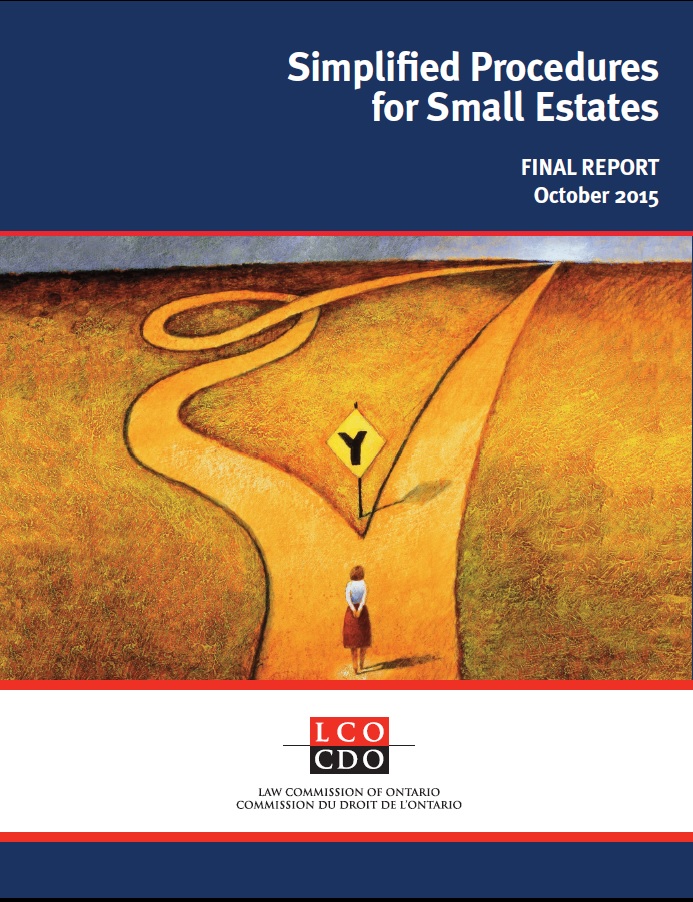Purpose of the Project
In this project we examined the probate system in Ontario as it affects small estates. Probate is a court process establishing legal authority to act on behalf of an estate and, although it is not mandatory, it is practically necessary to administering most estates. The concern has been that the cost of probate does not necessarily relate to the value of the estate being probated so that the cost can be disproportionately high for small estates. The smaller the estate, the more likely this is the case. In some cases, the cost will outweigh the benefits of probate altogether so that these small estates are not administered and whatever assets there are in the estate are not distributed. Although many people think of probate primarily as a vehicle for collection of estate administration tax, probate also provides important legal protection to testators, beneficiaries, creditors and estate representatives. Probate also provides commercial stability in relation to asset transfers after death. In general, probate promotes orderly estate administration. In this project, we considered whether small estates should be exempted from probate and ways in which the probate system may be simplified and made less costly for small estates so that its benefits are accessible to all estates regardless of value. Some jurisdictions, including some provinces in Canada, have adopted simplified procedures for administering small estates. There are a wide range of different approaches but they all attempt to strike a balance between the legal protection that is the purpose of probate and the affordability and accessibility necessary to ensure that small estates will, in fact, be administered. In our final report, we recommend that Ontario create a small estates procedure that incorporates elements from these different models but is ultimately a unique solution most appropriate for Ontario. The LCO Board of Governors approved the final report for the project in August 2015.
How We Carried Out the Project
The project was conducted in the following phases:
- Approval by the LCO Board of Governors in February 2012,
- Preliminary research and consultations to identify the scope of the project beginning in September 2013,
- Creation of an expert Advisory Group in March 2014 (government and court representatives, urban and rural estates practitioners and financial institutions),
- Determination of the issues to be addressed and the project methodology in June 2014,
- Release of a consultation paper in September 2014,
- Intensive proactive consultations from September 2014 to January 2015, including 5 focus groups with key stakeholder groups (including one with 9 individual estate representatives), numerous interviews and 11 written submissions received from individuals and organizations, a plain-language questionnaire made available online, in court offices, libraries and elsewhere throughout Ontario (with 24 responses),
- Commissioning of a research paper on balancing accessibility and procedural protection in a small estates process in Ontario completed in January 2015.
- Approval of the final report by the LCO’s Board of Governors in August 2015.
What Do We Recommend?
- The creation of a small estates probate process for estates valued up to $50,000, parallel to the regular stream used by larger estates. It would be designed to be much simpler to navigate without legal assistance. However, it would continue to be supervised by the court and would retain other essential legal protections.
- The small estates process would result in the issuance of a Small Estates Certificate that would have the same legal effect as probate except that the estate representative’s authority would be restricted to the estate assets listed in the application form, with one opportunity to amend the form.
- A range of legal supports as part of a small estates procedure that can be tailored to the value and relative complexity of particular estates. These include simplified forms and an online delivery system, a plain-language guide to probate, a telephone help line and the availability of cost-sensitive legal advice.
- In conjunction with a small estates process, a public education campaign on the importance of making a will and the creation of an online estates database that is publicly searchable in order to identify potential interests in an estate.
Project Documents
- PDF – Final Report August 2015
- Final Report – August 2015
- Consultation Paper – September 2014
- Consultation Questionnaire – September 2014

